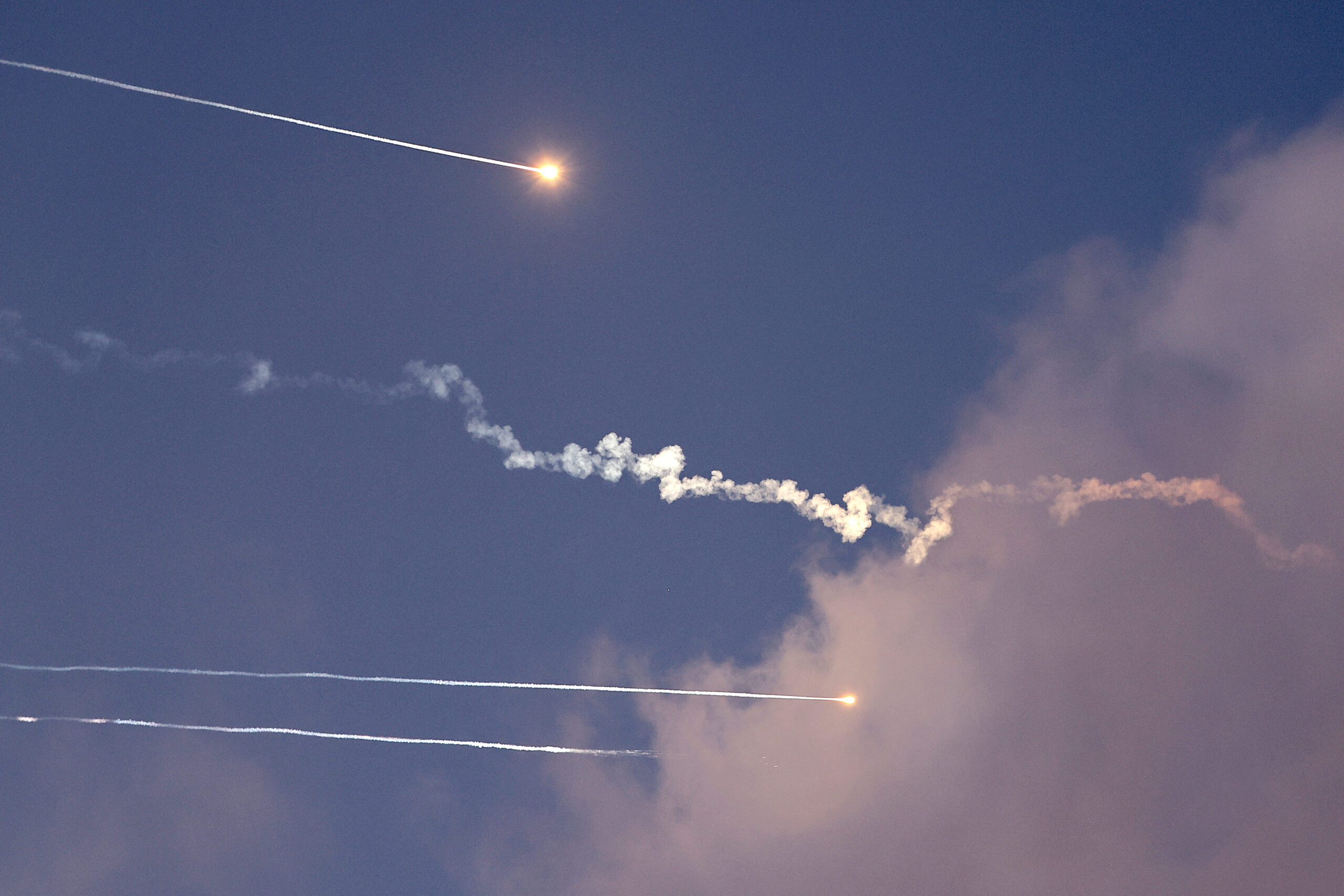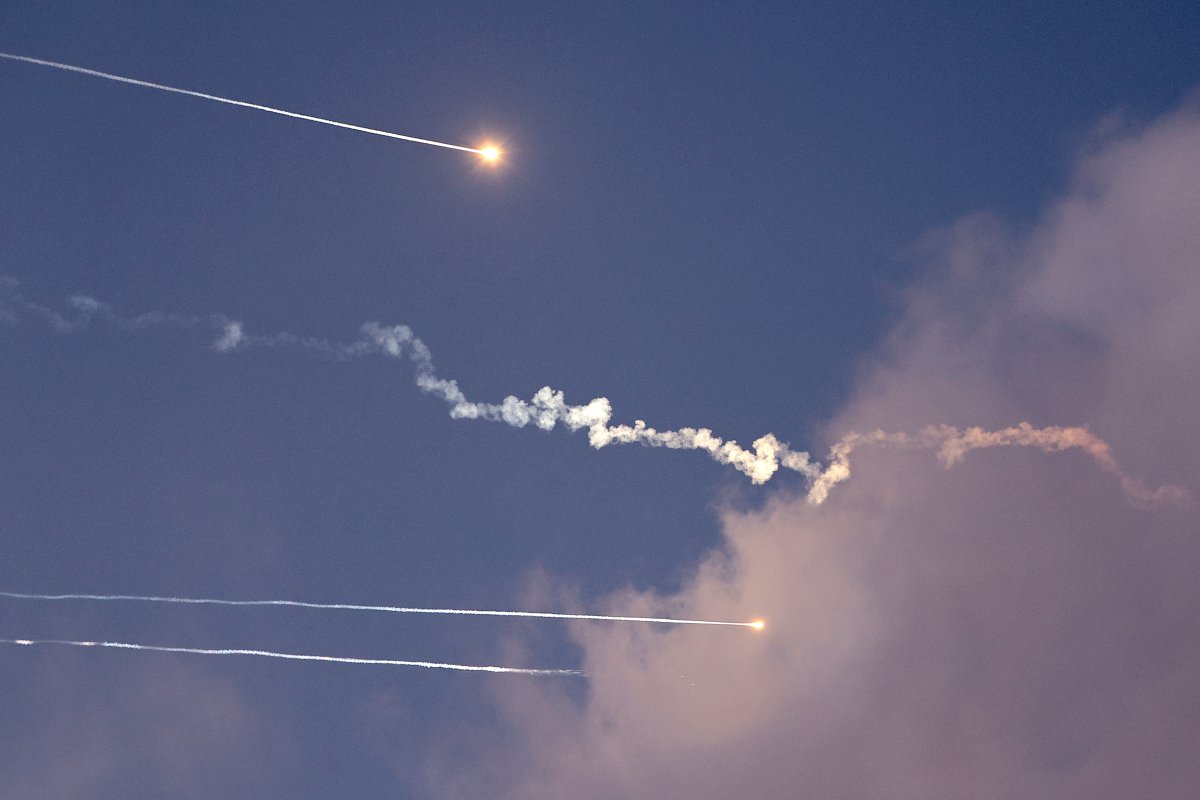
Iran has issued a warning to the U.S. and its allies not to help Israel repel its retaliatory attacks.
The statement on Iranian state media was addressed to the U.S., France and the U.K., which have strategic assets in the Middle East.
Hamidreza Azizi, a visiting fellow at the German Institute for International and Security Affairs, told Newsweek that if Iran targeted U.S. sites in the Middle East in its response to Israeli attacks on its nuclear capabilities, the move could be “catastrophic” for the Islamic republic.
Newsweek has contacted the U.S. State Department for comment.

JACK GUEZ/Getty Images
Why It Matters
Iran has said its talks with the U.S. over the Iranian nuclear program were “meaningless” following Israel’s strikes on its nuclear infrastructure on Friday. Tehran has accused Washington of supporting the attack.
While the U.S. has denied the allegation that it is complicit in Israel’s attacks, anticipation is building over whether American assets in the Middle East will get caught up in Iran’s response.
What To Know
Iran continued to fire missiles on Israel on Saturday in its response to Israeli attacks on the heart of its nuclear program and armed forces.
On Saturday, Iran said it had officially informed the U.S., France and the U.K. that it would launch large-scale attacks against Israel.
Tehran warned that any country that helped repel Iranian attacks on Israel could face attacks by the Islamic Republic, which would target regional bases “of the collaborating state.”
This includes sites in the Persian Gulf states and naval vessels in the Persian Gulf and the Red Sea, according to the statement on Iranian state media.
The U.S. operates permanent and temporary military sites across at least 19 locations in the region, the Council on Foreign Relations said.
Azizi said there was an understanding in Tehran that everything happening now—Israeli strikes and the broader military campaign—was approved by Washington.
In that sense, Iran might believe it already had enough justification to take on the U.S. and target American bases in the region—such as those in Iraq and member states in the Gulf Cooperation Council—thus expanding the scope of its target options.
This would allow Iran to use some of its shorter-range missiles to sustain the war, instead of relying solely on its longer-range missiles to target Israel, Azizi said.
But Tehran is concerned that such action would almost certainly provoke a strong American response, possibly even more effective than Israel’s, he added.
Iran relies on support—or at least neutrality—from Arab states with which it has been engaged in a process of rapprochement. Targeting U.S. bases in Arab countries at this moment would likely be seen as a serious escalation, alienating those states and isolating Iran diplomatically, Azizi said.
As Newsweek previously reported, James Anderson, a former acting undersecretary of defense for policy, warned that it would be “suicidal” for Iran if its forces tried to target American interests in the region.

JACK GUEZ/Getty Images
There are growing concerns over whether the U.S. could be pulled into the war via Iranian strikes or attacks by its proxy forces on American personnel in the region.
If Israel’s attacks against Iranian nuclear facilities are not effective and provide Tehran with an excuse to race toward developing nuclear weapons, then U.S. officials may use military force to prevent this worst-case scenario, according to William F. Wechsler, the senior director of the Atlantic Council’s Middle East programs.
Justin Logan, the director of defense and foreign policy at the Cato Institute, told Newsweek that U.S. President Donald Trump should not ask American service members to protect Israel from Iranian retaliation and should immediately remove U.S. troops from regional bases.
Meanwhile, Sina Toossi, a senior nonresident fellow at the Center for International Policy, said that even without direct involvement, Washington now faced the prospect of indefinite intelligence and diplomatic backing for Israel.
What People Are Saying
The Iranian government said on Telegram: “Any country that participates in repelling Iranian attacks on Israel will be subject to the targeting of all regional bases of the collaborating state, including military bases in the Persian Gulf states and naval vessels in the Persian Gulf and the Red Sea.”
Hamidreza Azizi, a visiting fellow at the German Institute for International and Security Affairs, told Newsweek: “At this stage, Iran has no desire to expand the scope of the war or invite direct U.S. involvement by targeting American bases and interests in the region. Iran might believe it already has enough justification to take on the United States. But on the other hand, it’s also a question of capabilities and consequences—a cost-benefit analysis.”
Justin Logan, the director of defense and foreign policy at the Cato Institute, told Newsweek: “The American president should make clear that the United States had no part in the Israeli attack on Iran. He should not ask U.S. service members to protect Israel from Iranian retaliation, and should immediately remove U.S. troops from bases in Iraq, Syria, and elsewhere that do nothing other than welcome Iranian reprisals.”
Sina Toossi, a senior nonresident fellow at the Center for International Policy, told Newsweek: “For the United States, the consequences could be profound. Even without direct involvement, Washington now faces the prospect of indefinite resupply, intelligence, and diplomatic backing for Israel.”
What Happens Next
Israel Katz, the Israeli defense minister, said on Saturday that Iran “will burn” if Tehran continued to launch missiles. The Israel Defense Forces has said the country’s air force is ready to resume striking targets in Iran, which has continued to send missiles into Israel.





